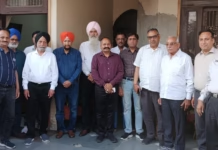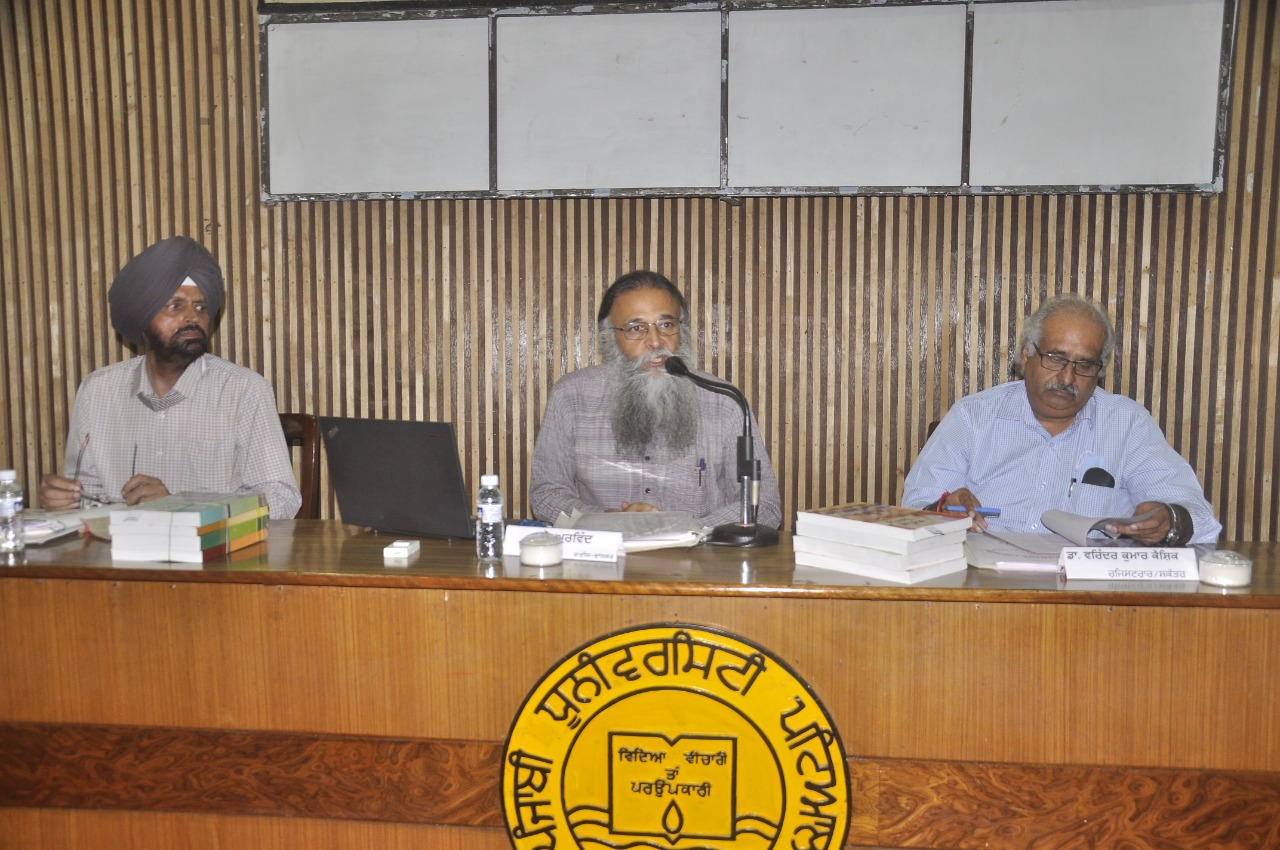Bankers raised unresolved issues- Throbbing them stiff
KS Diwan/ royalpatiala.in/ Patiala
The Punjab State Unit of the All India Bank Officers’ Confederation (AIBOC), the largest Association of Bank Officers in the Banking Industry representing more than 3.20 Lacs officers working in different Public Sector as well as Scheduled Private Sector Banks all across the country today hold a press Meet in newly constructed Patiala Media Club situated at 6D Passey Road, Patiala. The Press Meet was organized to commemorate the Golden Jubilee of Bank’s Nationalization. The Banks in India were nationalized in 1969.
The all India Vice President of AIBOC Deepak Sharma and Secretary of its Punjab Unit Rajiv Sirhindi told that the members of this mighty Organisation have been playing active role and responsibility, right from framing the policy, till its implementation in Banks. They said that the Nationalization of Banks in 1969 gave a new dimension to the banking in the country. Banks became extended arms of the Government, implemented wholeheartedly, various pro-society programmes such as village adoption, irrigation, the dispensation of credit for agriculture and small business, realized the objectives of Government in the successful completion of green, white, blue revolutions. They said that Banks realized dream projects of Government – Pradhan Mantri Jan Dhan Yojana (PMJDY) affordable insurance scheme, Aadhar linking, DBT and Demonetisation/Remonetisation of the economy. Banks today, have touched nook and corner of the country, thereby achieving the pursuit of financial inclusion.
The leaders of the Bank Officers told that the Bank men in India have opened more than 33 crores PMJDY accounts, more than 10 crores PMSBY, more than 5.35 crores PMJJBY, more than 2.3 crores of Atal Pension Yojana, more than 3 lac crores disbursed in Mudra loans, Gas subsidy, Sukanya Samridhi Accounts, besides serving the countrymen by disbursing Kissan Samman Yozna, Direct Bank Transfer amount etc etc. But some of the very important issues have remained unresolved despite repeated attempts and agitations. They said that as a responsible Trade Union representing the aspirations of over 3.20 lakh bank officers, we have already taken up these issues with IBA, individual banks and also the Ministry of Finance. We will be constrained to lodge an extensive agitation program throughout the country if our legitimate issues are not resolved, said the Officers’ leaders.
Those among Bank Officers’ Leaders present on the occasion includes, K K Paul from PNB, President AIBOC, Punjab, Harshvinder Singh from Bank of India, Satish Kumar, Mahesh Kumar, Aman Arora, Navsukh Sethi from PNB, Tarun Kumar, Parminder Singh from Canara Bank, from SBI Lajpat Goyal, Harinder Gupta, Gurmukh Singh, Binay Sinha, Jasbir Singh, Harbagh Singh, Davinder Gupta, Manish Kumar, Devinder Singh, Dinesh Gupta, Om parkash, Amritpal Singh, Arun Chawla, Amanjot Singh, Tanpreet Singh were also present.

UNRESOLVED ISSUES OF BANK OFFICERS
- Salary revision: Though the salary revision has fallen due for revision from 01.11.17, no meaningful dialogue has taken place till date. There have been few issues which have become impediments in the negotiations. They are:
Fractured mandate: So far, member banks were giving a mandate to IBA for salary negotiation up to General Manager cadre (from Scale I to Scale VII – Scale VII being General Managers), as they are subjected same sets of service rules.
Despite our repeated requests, discussions and agitations, neither Government nor banks nor IBA have taken any initiative to get the mandate from 5 banks which are yet to give a full mandate. This fractured mandate has become a stumbling block in negotiation. Banks which are yet to give a full mandate to IBA are State Bank of India, Bank of Baroda, Punjab National Bank, Union Bank of India and Indian Bank. We have requested Finance Ministry to issue suitable instruction to them to mandate IBA immediately, paving way for meaningful negotiation.
- Charter of Demands and the parity of salary vis-à-vis Central Government officers: For all practical purposes, officers of banks are treated as public servants. As a matter of fact, Bank officers have been equated to Group ‘A’ officers of Central Government. The service conditions are also on the lines of Civil Services. Banks are working as the extended arm of the Union Government, implementing its policies and programmes in the financial sector and are under the control, supervision and ownership of Government. This being the situation, it is unfortunate that the same yardstick is not being followed while carrying out a revision of salaries and allowances for these two sets of officers.
- Pension updation: Pension is revised for retired Government employees with every pay revision automatically. Recently, the Government has updated pension of RBI personnel. But, for bankmen, it does not happen at all. With this, many are being paid pension which is awfully low. We request that pension needs to be updated with every salary revision and family pension needs to be revised as is applicable to Government employees.
- Working Environment in Banking Industry and recruitment of staffs: Perhaps, the banking industry is the only industry where business doubles every 10 years, but the staff position halves. There was no recruitment in Banks for decades and decades. This decade is termed as a decade of retirements.
This has also been one of the reasons for increased ill-health among bank officers. A large number of suicides are being reported. Young Officers are suffering from cardiac/lifestyle diseases. It is not out of place to mention here with recently, a young officer in 30s suffered a heart attack on duty. There is an urgent necessity to bring in a suitable law so as to prohibit exploitation of officers.
- Misplaced focus of bank business: Banks were meant to be a bridge between savers and the users of money. Additionally, Banks were also carrying on few ancillary services, which are not being handled by any other Institutions as such, like Custodial Safe Deposit, Safe Custody, Advisory Services etc. to help customers. In fact, these were complimentary services to the banking business. Powers that be, want the banks to be ‘super market of all financial services” and hence included marketing of third-party insurance, mutual fund products etc. within the ambit of banking business while there is no augmentation of staff for the same.
- Strangulating and Weakening Public Sector Banks: There is an orchestrated effort to strangulate and weaken the Public Sector Banks through the NPA weaponry. Through a designed set of Schemes (like CDR, SDR, JLF, S4A etc.), the RBI permitted the banks to evergreen their NPAs for more than a decade. Suddenly in the year 2016 & 2017, the banks were forced to declare these ever-greened accounts as NPAs and provide for them out of their Operating Profits within two-three quarters under the Asset Quality Review (AQR) policy (which was declared by the then RBI Governor, Raghuram Rajan, but was found to be totally wrongful two years later).

- Denationalization of Banks: During 1969 and 1980, the then Government nationalised many banks to ensure availability of banking facilities to the common man of the country, liberating them from the clutches of money lenders. Public Sector Banks have played a stellar role in the success of all revolutions be it Green, Blue, White. Public Sector Banks took banking to the places which were not accessible and in which private banks were/are not interested. Public Sector Banks have implemented pro-citizenry programmes like No-Frill Accounts, Jandhan, affordable insurance schemes of the government including Aadhaar, which are unheard in any part of the world. Today’s financial and economic independence of the countrymen is on account of the active role played by the Public Sector Banks which account for around 80% of Indian banking and nearly 100% in rural areas.
The result will be closure of bank branches in name of rationalization of branches. Common man will suffer as branches will be closed. We have already witnessed this in the merger of Associate Banks with State Bank of India (It is reported that more than 2500 branches have been closed after merger in SBI). These, we believe, are steps in the direction of privatization. Robust, time-tested and huge banking resources and network may go to the hands of corporates and foreign entities. Government is fast tracking Mergers & Acquisition in banking, which is a route already proved to be unsuccessful and therefore abandoned in the global economy. This year, being the Golden Jubilee Year of Bank Nationalization, we appeal that the benefits derived from Nationalization may please be kept in mind and endeavour to flourish the public sector banks. Further, we urge you to nationalise all old generation private sector banks in the larger interest of customers and the nation.
Five Day Week: At present, it has become a priority, which is likely to bring many positive effects, such as increased productivity, improved job satisfaction and morale, decreased absenteeism, reduced energy costs and work-life balance. Globally, the organizations work 5 days a week. The working conditions in the Banks have been strenuous. Poor infrastructure, lack of adequate staff has made the officers till late in the night, resulting in poor health, huge pressure on the officers, which culminates in serious work-leisure mismatches, life style diseases and of late, repeated acts of suicides being committed by the officers of the Banks. Introduction of Five-Day Week will not only result in savings to the organization in terms of overheads and bring in a human element in the officers’ lives, but also would enable a meaningful social life – which in turn will result in higher efficiency in work place.
National Pension System (NPS): While the contribution is defined and certain in this scheme, the return is most uncertain and undefined. The funds of NPS are subject to market risk. This does not provide family pension, which convention pension provides, in cases of unfortunate death of pensioner. We also urge to restore the Old Defined Benefit Pension scheme and scrap the National Pension System, which has been implemented in Banks since August, 2010. There is tremendous resentment amongst the new recruits, who want restoration of the Old Pension Scheme.
- Reckoning allowances as Basic for the purpose of arriving superannuation benefits: It is also pertinent to submit that all allowances counted for the purpose of making contribution to the Provident Fund and for the payment of Dearness Allowance are the component of Pay for the purpose of computation of Pension in terms of Pension Regulation 2(s)(b)(ii). The employees who fall under the Xth Bi-partite settlement should also be rightfully extended the benefits of this landmark judgment.
- Taxing Leave Encashment: Every employee, whether in government or others, works hard, makes all endeavour to save the Privilege Leave (Earned Leave) as it can be encashed upon superannuation. To that extent, employee would have undergone stress, strain and inconvenience, with the only aspiration these saved leaves can be monetised, resulting in a corpus amount that can come to his/her rescue, post-retirement. Essential this is a part of a social security measure, Government should think of.
Here, we have observed an aberration of inequal treatment of citizens of the country. Income Tax Act treats the government and non-governmental employees differently. While entire Leave Encashment amount is tax free in the hands of government employee and the legal heirs of diseased, non-governmental employees, including bankmen, are not extended with this benefit and in their cases, tax exemption is restricted to Rs. 3 lakh only, which is unfair and discriminatory.
- Data integrity and safekeeping: Banks have been collecting personal details, Aadhar, PAN, thumb impression of customers and staff for various purposes, be it a part of KYC or for access control. There are umpteen number of incidents where bank appoints third party in handling its affairs. In the garb of access control, the thumb impression of officers and staff are obtained and handled by third-party, outsourced agents. This is a ticking bomb. These are likely to be hazardous sooner or later unless they are safe-vaulted and third party vendors are obviated. We request you to instruct, in strict terms, that the Banks shall not assign any task which involves storage and handling of personal / KYC details to third party vendors. This is not only in the interest of the officers / staff and customers, but also in the interest of the banks and the economy.
- l. Attack on Bankers
- i) Need to put in place adequate security measures: There have been frequently reported incidents of attacks on bankers, both by miscreants, disgruntled elements and motivated mobs. Recently, an officer was shot dead in the broad day light by miscreants within the bank premises. Many officers monitoring loans and on recovery job, have lost their precious lives in the line of duty or faced fatal injuries due to the faulty policies and inadequate security measures deployed by the bank management. Customers also being injured/ murdered when such incidents happen. Banks have been compromising with the basic requirement of security arrangements including posting of armed guards at branches and security personnel at ATM sites in the name of curtailing overheads. For past more than one-and-a-half years, almost all banks – both public and private sectors – have stopped deploying armed security guards at their branches and ATM counters. As such, banks and ATM sites have become soft targets for the dacoits and terrorists. The security arrangements need to be fortified to instil the confidence in officers and customers. We urge the Finance Ministry to issue suitable instructions to the banks and all the state government machinery to provide adequate security arrangements at bank branches and ATM sites for the bank personnel and customers. Banks should recruit their own permanent security personnel for better and continuous monitoring of security measures in the Bank, instead of depending on out-sourced personnel/agencies.
- ii) Implication of Bank Officers in False cases:
With the coming into effect of various banking reforms in the country, Bank through their officers are taking all steps to initiate action against all such firms/individuals/financial institutions etc. who had violated the financial discipline and had been categorized as Non-Performing assets. In view of the action on behalf of the Bank such willful defaulters are all out to create vengeance against the bank officials so as to thwart the process of recovery while taking the instrumentalities of state, most particularly, the police administration to their side. In the recent past, we have seen many cases where the investigating agencies have overstepped and overpowered in handling the cases of officials of public sector banks. To make issue more clear we share with you a recent case wherein five officers of State Bank of India including three lady officers have been falsely implicated by the Punjab Police on the behest of a defaulter. The FIR lodged by the Punjab Police in the case is one classic example of false implication of the bank officials in order to avoid the rigors of law for recovery of the outstanding loan amount from the defaulter. In this connection, State Bank of India has also filed a petition in the Hon’ble Punjab & Haryana High Court to transfer the case to an independent agency including CBI outside the state of Punjab.
Rising NPA due wrong Policies: The intention of the Government and the Reserve Bank of India for not publishing the names of wilful defaulters is the root cause of rising NPAs in Public Sector Banks. We demand from the Government as well as the RBI to immediately publish the names of wilful defaulters of the Banks so that the hard-earned money of the general public of our country may be recovered from such defaulters.













